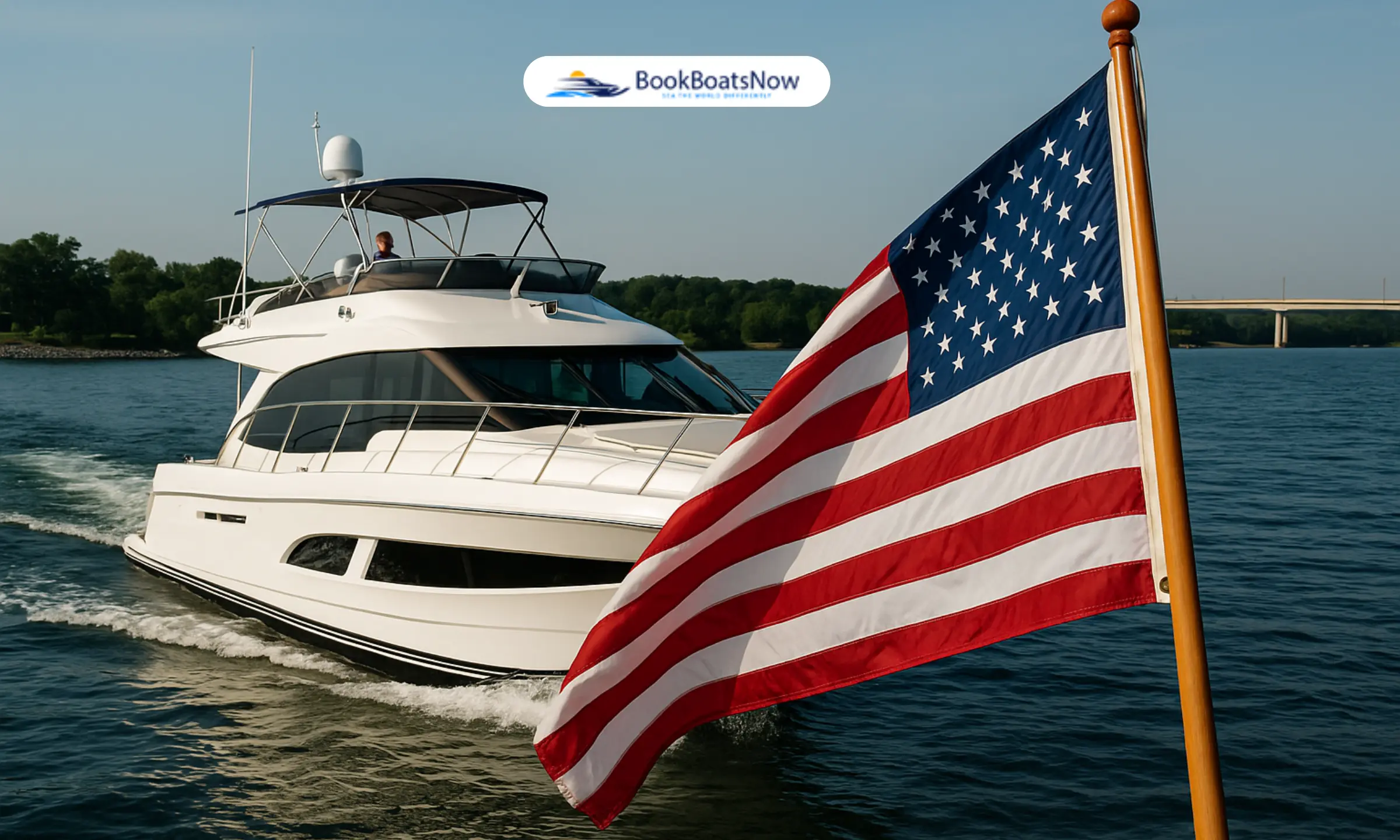Yacht rental rules in the United States aren’t the same everywhere. Each state follows its own boating laws, licensing standards, insurance requirements, and environmental guidelines. Whether you’re a first-time renter exploring Florida’s coast or a boat owner listing your vessel in California, understanding these laws can save you from fines, insurance disputes, or safety issues.
At BookBoatsNow.com, we aim to simplify your rental experience while keeping compliance front and center.
Why Boating Regulations Differ Across States
Unlike road traffic, boating laws in the U.S. aren’t entirely federal. The U.S. Coast Guard (USCG) sets nationwide safety standards, but every state’s Department of Natural Resources (DNR) or Boating Commission defines local requirements for registration, operator licensing, and safety gear.
Key Factors Behind Variations
-
Geography: Coastal states like Florida and California have marine regulations, while inland states like Colorado focus on lake boating.
-
Waterway Type: Ocean vs. lake vs. river boating requires different safety and navigation rules.
-
Tourism Volume: States with heavy recreational traffic have stricter commercial licensing and insurance rules.
Example:
Florida requires renters born after January 1, 1988 to hold a Boating Safety Education ID Card, whereas Texas accepts a broader online certification.
Federal Boating Requirements (Applicable Nationwide)
While states manage local waters, federal laws apply to all U.S. navigable waters.
Mandatory Federal Standards
-
Life Jackets (PFDs): One per person, U.S. Coast Guard–approved.
-
Fire Extinguishers: Required on all motorized vessels.
-
Visual Distress Signals: Mandatory between sunset and sunrise.
-
Sound Devices: A whistle or horn must be available.
-
Navigation Lights: Needed for operation after dark.
-
Pollution & Waste Rules: Illegal to discharge sewage or oil within 3 miles of shore.
BookBoatsNow verifies that partner owners comply with these minimum federal standards, ensuring every rental meets safety expectations.
Florida: The Nation’s Boating Capital
Florida leads the U.S. in registered vessels (over 1 million boats) and is often called “The Boating Capital of the World.”
Key Florida Regulations
-
Age & Licensing: Operators born after 1988 need a Boater Safety Education ID.
-
Insurance: Personal boat insurance isn’t mandatory but is strongly advised.
-
Alcohol Limits: Blood Alcohol Concentration (BAC) limit = 0.08%.
-
Environmental Rules: Strict anchoring and seagrass-protection zones.
Local Tip:
If you’re planning a Miami, Key West, or Tampa yacht trip, confirm your operator’s license and check that the charter complies with Florida Fish & Wildlife Conservation Commission (FWC) guidelines.
California: Sustainability & Safety First
California emphasizes eco-friendly boating and environmental protection.
Important California Laws
-
Boater Card: Mandatory for anyone operating a motorized vessel (phased rollout since 2018).
-
Engine Standards: Vessels must meet CARB-approved emission levels.
-
Noise Limits: 86 dB maximum at 50 feet.
-
Zero-Discharge Zones: No dumping of waste near the coastline.
California’s Division of Boating and Waterways (DBW) enforces these regulations, aiming to preserve marine life and reduce pollution.
Texas: Safe Boating Across Lakes & Rivers
Texas has over 580,000 registered boats, making it another leading boating state.
Key Texas Rules
-
Boater Education: Required for anyone born on or after September 1, 1993.
-
Registration: All motorized boats must be registered through Texas Parks and Wildlife.
-
Insurance: Not required by law, but most marinas demand proof.
-
Navigation: Boats must stay 50 feet from swimmers and marked swimming areas.
For Lake Travis or Galveston Bay rentals, BookBoatsNow’s verified owners meet all these compliance checkpoints.
The Northeast: Licensing & Seasonal Restrictions
In states like New York, Massachusetts, and Maine, seasonal boating dominates, and ice-free months dictate most rentals.
Regional Highlights
-
New York: Empire State Boating Safety Certificate mandatory for all operators by 2025.
-
Massachusetts: Under-18 operators face stricter horsepower limits.
-
Maine: Emphasizes cold-water safety and life-jacket enforcement.
Pro Tip:
If you’re planning a summer yacht trip in the Northeast, always check seasonal registration renewal and insurance periods before booking.
The Great Lakes States: Cross-Border Compliance
The Great Lakes span multiple jurisdictions (Michigan, Illinois, Wisconsin, Ohio, Minnesota), each enforcing slightly different boating rules.
Common Points
-
Registration valid for 3 years, renewable through DNR offices.
-
Mandatory PFDs for children under 13.
-
Cross-State Travel: Carry registration and proof of ownership—waters may border Canada.
-
Alcohol Rules: Enforced under BUI (Boating Under Influence) laws similar to DUI penalties.
BookBoatsNow verifies all Great Lakes listings for compliance before making them live on the platform.
Insurance & Liability: What Renters Should Know
Even though insurance laws vary, U.S. boat renters should always confirm liability coverage before sailing.
Recommended Coverage Types
-
Hull Coverage: Protects against physical boat damage.
-
Liability Coverage: Covers injury or property damage to others.
-
Medical Payments: Optional, but useful in accident cases.
-
Personal Effects: Covers loss of personal belongings onboard.
Some states require marina operators or commercial charters to maintain minimum liability limits. At BookBoatsNow, all verified listings include clear insurance details for renter transparency.
How to Stay Compliant as a Renter or Boat Owner
For Renters
-
Complete a recognized boating safety course.
-
Verify that the vessel is registered and insured.
-
Check onboard safety equipment (life jackets, flares, extinguisher).
-
Avoid alcohol while operating.
For Boat Owners
-
Keep registration and inspection certificates up to date.
-
Ensure your vessel meets Coast Guard safety gear standards.
-
Provide clear renter instructions and a signed waiver.
-
Follow environmental best practices: no littering or fuel spills.
Compliance builds trust and reduces risks—both for guests and operators.
Final Thoughts — Safe Sailing, Anywhere in the U.S.
Navigating America’s diverse boating laws might seem complex, but it’s an essential part of enjoying the water safely and responsibly. Whether cruising in the Florida Keys, sailing under California’s sun, or exploring the Great Lakes, understanding each state’s rules ensures smoother, worry-free trips.
BookBoatsNow.com connects renters with verified, compliant yacht owners nationwide—so you can focus on what matters most: enjoying your time on the water.


